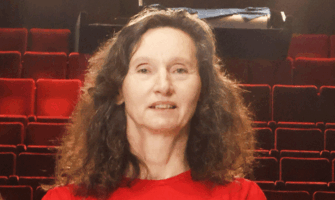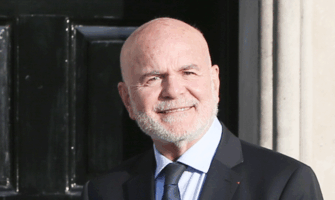
Susan Kirby
SUSAN KIRBY is less than six months in the post as chief executive of the film and TV business lobby group Screen Producers Ireland (SPI). This is the role she took on after her predecessor, Elaine Geraghty, moved to head up moneybags Joe Devine’s Ardmore and Troy film studios operation. Geraghty may have timed her exit well, as Kirby has been left to deal with some potentially awkward script changes as questions are raised about the liberties being taken here by Irish producers, as well as the likes of Disney, which is behind Disenchanted.
A perusal of Irish media coverage of the Disney shoot in Dublin, Wicklow and Louth reveals lots of soft focus ‘news’ items, chock-a-block with relentless recycling of the ‘fairy tale’ motif. Everybody is a winner apparently, from local residents and businesses to eager Irish performers and crew. Hollywood has come to Ireland, so let’s break out the Champagne. The reality is that behind the scenes all is not well. And the focus is starting to turn to SPI.
Kirby’s stint in the hot seat coincided with the conclusion of negotiations on a new three-year film agreement with actors union Irish Equity. After she signed off on the ‘Irish Film Agreement’, which came into force on February 1, things began to unravel. Actors started a campaign against the terms of the agreement and focused on its failings when compared with current agreements in, for example, the UK and the US. The discontent led to a seven-hour Equity AGM in late March, at which a new executive was elected and resolved to renegotiate the agreement with SPI.
BUYOUT FEE
In the meantime, Morgan O’Sullivan and James Flynn’s Section 481 tax credit ‘special purpose vehicle’, Clocktower Productions DAC, started hiring and casting subsidiary parts for Disenchanted (the sequel to the 2007 box office hit Enchanted) starring Amy Adams, Patrick Dempsey and Maya Rudolf. Among those sought, both in Ireland and the UK, were trained dancers for the musical sequences. It turns out that the dancers were being offered about €1,500 a week, to include a buyout fee for all royalties and residual rights. For this they are expected to work an 11-hour day, five days a week.
On a big budget film like Disenchanted the Equity UK rate would be significantly more. The rates being offered for Disenchanted translate into a loss of more than £5,000 for dancers employed in filming in Ireland over five weeks shooting compared with what they would get if the production were taking place in the UK. The offer to UK-based dancers of €1,600 to cover all expenses over a five week period – including flights, accommodation, travel and food – was also deemed grossly inadequate.
Despite having no negotiating status in Ireland, Equity UK raised the issues with Disney, and with O’Sullivan and Flynn’s Clocktower Productions, technically the employer. An Equity UK spokesperson told The Stage publication, “Despite these limiting factors, we’ve engaged with Disney, Irish Equity and, of course, the dancers. We have emphasised that this treatment of our dance members is unacceptable, and despite having no jurisdiction in Ireland we have ultimately pushed this matter as far as we can … We will continue to champion the rights and fair treatment of members wherever they work – both where we have jurisdiction and where we don’t.”
The UK union’s bolshie approach contrasts with the scenario in Ireland, where the trade unions in the movie business – those recognised by Ictu as the ‘Film Group’ of unions, and including Siptu – have tended not to interfere with the foreign direct investment/gig economy model. This contrasts with efforts by John Arkins’s non-affiliated Irish Film Workers Association, which has been refused official negotiating status. (IFWA agitation, supported by Richard Boyd Barrett in the Oireachtas, did manage to result in a defined training career path for crew entering the business.)
When Kirby and SPI board member Mark Byrne (Element Films’ legal exec) signed off on the new deal with Irish Equity (a Siptu affiliate), they could not have anticipated the plot twist that saw a new Irish Equity executive installed, with Gerry O’Brien taking over as president from long-time incumbent Padraig Murray. The former had run on a platform of renegotiating the agreement.
Any renegotiation with SPI is to primarily focus on the share-out with performers of so-called residuals payments that are made to producers on foot of programme sales and repeat screenings, which are an industry standard in other jurisdictions. Also on the agenda are working time arrangements.
O’Brien told Goldhawk that there has been an uptake in Equity membership as younger actors have educated themselves regarding agreements and contracts. “They have also learned that they have rights and protections under the copyright act which must be incorporated into any future agreements.” Moreover, there is now an understanding that Equity “must be supported to prevent further erosion of the rights of performers. There is also an appetite to face down the Irish producers over their treatment of professional Irish performers”.
Under O’Brien’s presidency, Equity is demanding more oversight of the industry, given the wedge of taxpayers’ money ending up in the coffers of the companies that make up most of SPI’s membership: “All the semi-state organisations must ensure that the legislation of the state that protects the citizens of the state is implemented in full. That includes the working time act and the copyright act, which protects the rights of Irish performers.”
It turns out that for almost 30 years Irish actors have been signing so-called buyout contracts that cut the performers out of the residual income. According to O’Brien, the Irish actors are financially discriminated against “particularly when it comes to co-productions. In this instance the disparity in pay and terms and conditions is quite substantial”.
The stage is now set for a face-off between O’Brien’s Irish Equity and Kirby’s SPI, with the newly energised union seeking something close to the existing UK Equity agreement that covers both television and film productions.
There are a number of high-profile co-productions currently shooting here where Irish production companies are benefiting from investment from the BBC and ITV, yet they only offer the ‘Irish’ buyout contract, cutting the indigenous performer out of the ongoing residual and usage payments that feature in the standard BBC and ITV agreements. These shoots are also backed by the state film funding agency, Screen Ireland.
Kirby took up her SPI post just as former Green party leader John Gormley was finishing up as chair of the lobby group. He has been replaced by industry outsider and former Irish UN ambassador David Donoghue, who is probably better known as the brother of author Emma ‘Room’ Donoghue.
Also on the SPI board are producers Stuart Switzer and Aoife O’Sullivan, who put in an appearance before the Oireachtas committee last year; MacDara Kelleher, who has connections to Troy Studios; and Mark Byrne of Element Pictures.

Elaine Geraghty
DISASTROUS EXHIBITION
Prior to joining SPI Kirby spent 10 years as chief executive of Dublin’s annual St Patrick’s Festival, chaired by the ubiquitous David Harvey. She moved to that post from a marketing gig at Dublin’s Gaiety theatre. And although there was plenty of detail in the press release about Kirby’s previous roles, there was no room to mention her attempt to rescue the disastrous Dublin Contemporary 2011 exhibition.
DC2011 was far from a success, with €4m gobbled up by an event that was supposed to be an Irish version of the Venice Biennale. It was overseen in the end by Jota Castro and Christian Viversos-Fauné, two curators flown in for the six-week shindig.
DC2011 had originally been the brainchild of Imma’s Rachel Thomas and arts consultant Oliver Dowling but things fell apart pretty quickly and Thomas was replaced by Lesley Tully, while control of the whole project was shifted to the St Patrick’s Festival operation. Kirby, who was in situ as chief executive there, took on the same role at DC2011 in 2010.
The art event was eventually staged in September 2011 to general indifference (any possibility of a sequel ended up on the cutting room floor), which might explain why Kirby has left it off her CV. The episode should, however, have prepared the new SPI boss well for dealing with the luvvies of the film and TV industry.
SPI has evolved through a succession of names, from its 1980s origins as an association of independent director-producer types – filmmakers who combined both the creative and business roles. Eventually it morphed into Film Makers Ireland, before finally becoming SPI, which represents the interests exclusively of film and television producers and production companies.
The transition marks a copper-fastening of power here of the producer members, who exclusively contract with broadcasters and Screen Ireland and who are the direct beneficiaries of the Section 481 tax credit worth €111m in 2019 alone.
Perhaps the producers’ most impressive achievement has been to secure funding for SPI through levies related to television commissions and Section 481 funding for film and TV production. Kirby inherits a healthy set of books at SPI, judging by the 2019 figures. A company limited by guarantee, the lobby organisation was sitting on an accumulated surplus of €310,000 at the end of that year.
Income for the year was €437,000 but only €40,000 of this is accounted for by membership fees (charged at €400 per company). The balance is made up from the levy on RTÉ (€200,000), a levy on each independent production undertaken here by member companies (€123,000), TG4’s €32,000 levy contribution, and grants from Screen Ireland (€30,000) and the Broadcasting Authority of Ireland (€12,000).
It is only in recent times that the Revenue Commissioners ruled that the levy on productions charted by SPI does not count as qualifying production expenditure for Section 481 tax credits. As a result, SPI members, having had the taxpayer underwrite the cost of the levy for 25 years, now have to add it to their own overheads.
According to the SPI’s terms and conditions for members: “If the company produces a film or television production … the company shall pay to SPI a levy amount equivalent to 0.25% of the Section 481 eligible spend or the total Irish spend, with a cap of €20,000 per project.” (For projects funded by RTÉ or TG4, their respective production levies will apply.)
It goes without saying that non-members of SPI (such as Alan Maloney’s Parallel Productions) are not subject to these conditions/expenses. Also, a 65% discount now applies to animation industry members – a telling attempt to woo them back into the fold after all the major cartoon characters left SPI in 2015 to set up their own representative group, Animation Ireland.
This represented a severe blow to SPI’s claim to represent all the producers in the industry, particularly given that the overall value of Irish animation production has now overtaken that of all other categories of Irish production together, including live action drama.
What no doubt concerns Kirby is that SPI currently has only 118 members (including SPI itself, somehow) many of which are small, one-person operations that have been severely stressed by the pandemic. This may explain the recent introduction of a 50% membership fee cut to €200 for what are termed “emerging producers”.
Susan Kirby and her predecessor in SPI, Elaine Geraghty, received lots of rave reviews recently when a report into the benefits of the Section 481 film and TV production tax credit, commissioned from PwC by Ardmore/Troy was published. SPI backed the report financially but refused to tell Goldhawk how much was handed over. The taxpayer, through Screen Ireland, had co-funded the first edition of the report last year but did not join in this time around.
BANG FOR BUCK
No doubt Kirby’s lobby group was happy with its bang for buck, given the general hoopla and widely reported claims of economic “impacts”. And, while the new report touts a “total economic impact” of €417m arising from a tax credit input of €111m in 2019, Screen Ireland’s own calculations claimed that the total film and TV production expenditure here that year was €358m.
Critics claim that the current funding model results in a sector that is unsustainably dependent on incoming productions, which need ever greater taxpayer subsidy and diluted protections for performers but create little of lasting value in the Irish economy (such as intellectual property registered here).
On the other hand, Andrew Lowe of Element Pictures, who is chair of Ibec’s Audiovisual Ireland group, notes in the PwC report: “Without Section 481 there would be no screen industry in Ireland … Most developed countries have a tax credit to support their TV and film industry, our industry would stall and shrink if the tax credit did not exist”.
In the five years of operation of the Section 481 scheme as a tax credit, however, the annual cost has never even been broken down between productions that receive a tax credit based on profits recorded and those (the majority) that simply get a cheque in the post. Nor is the exact amount of taxpayers’ money ploughed into individual productions revealed.
Arguably, in the film and TV sector, the reliance of the SPI in report after report on “full time equivalent” employment numbers, rather than actual employee numbers and their periods of employment, has been an exercise in obfuscation for many years. And while much lip service has been paid to gender equality and diversity in the industry, little has been done to break down employee data by gender, ethnicity, pay levels, or periods worked. Transparency is far from the top of the bill for an industry that receives about €125m in annual public funding.
Kirby, meanwhile, will be keeping her fingers crossed that increasing agitation over the sort of contracts on which performers are being hired by Irish producers – especially those partnering foreign behemoths like Disney – doesn’t lead to an unhappy ending.



















